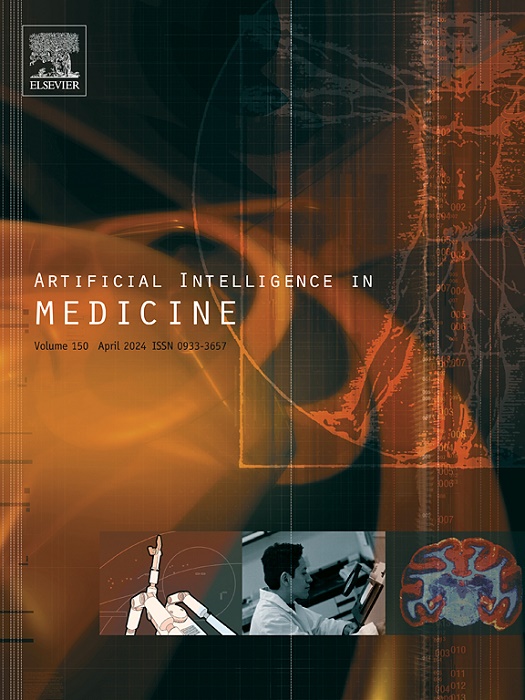A prior knowledge-supervised fusion network predicts survival after radiotherapy in patients with advanced gastric cancer
IF 6.2
2区 医学
Q1 COMPUTER SCIENCE, ARTIFICIAL INTELLIGENCE
引用次数: 0
Abstract
Background and objective:
Predicting overall survival (OS) for advanced gastric cancer patients after radiotherapy is critical for developing an individualized treatment plan. However, existing studies have focused on gastric cancer CT images with a large amount of redundant information, neglecting the role of physicians’ prior knowledge in guiding gastric cancer CT image information. We propose a multimodal fusion method based on prior knowledge to predict OS after radiotherapy in advanced gastric cancer patients to assist physicians in clinical diagnosis and treatment.
Methods:
A prior knowledge supervised fusion network (PKSFnet) is proposed. Firstly, PKSFnet uses a novel sampling strategy, which enables the input model data to obtain a complete feature space by analyzing the entire patient data space. Afterwards, under the guidance of the multi-domain feature fusion module (MdFF), multimodal information of patients is adaptively fused and mined to improve the prediction performance.
Results:
The results of the proposed model are superior to those of other unimodal and multimodal state-of-the-art methods. For the segmented survival time classification task, the AUC, specificity, sensitivity, precision of the proposed model are 0.8397, 0.875, 0.7556, and 0.875, respectively. For the survival risk regression task, the C-index and HR of the proposed model are 0.8574 and 4.658 respectively. Ablation experimental results further demonstrate the impact of each module of the proposed model. Finally, we apply the novel sampling strategy to other deep learning models and achieve significant improvement.
Conclusion:
The experimental results have demonstrated that the proposed model can effectively predict OS after radiotherapy in patients with advanced gastric cancer, which demonstrate that the proposed model can facilitate the development and application of robust clinical treatment strategies.
先验知识监督融合网络预测晚期胃癌患者放疗后的生存
背景与目的:预测晚期胃癌放疗后患者的总生存期(OS)对于制定个体化治疗方案至关重要。然而,现有的研究主要集中在具有大量冗余信息的胃癌CT图像上,忽视了医生先验知识对胃癌CT图像信息的指导作用。我们提出一种基于先验知识的多模式融合方法来预测晚期胃癌患者放疗后的OS,以协助医生进行临床诊断和治疗。方法:提出一种先验知识监督融合网络(PKSFnet)。首先,PKSFnet采用了一种新颖的采样策略,通过分析整个患者数据空间,使输入模型数据获得完整的特征空间。然后,在多域特征融合模块(MdFF)的指导下,对患者的多模态信息进行自适应融合和挖掘,提高预测性能。结果:所提出的模型的结果优于其他单峰和多峰最先进的方法。对于分段生存时间分类任务,该模型的AUC、特异性、灵敏度和精度分别为0.8397、0.875、0.7556和0.875。对于生存风险回归任务,该模型的C-index和HR分别为0.8574和4.658。烧蚀实验结果进一步验证了模型各模块的影响。最后,我们将新的采样策略应用于其他深度学习模型,并取得了显著的改进。结论:实验结果表明,所建立的模型能够有效预测晚期胃癌患者放疗后的OS,说明所建立的模型能够促进稳健的临床治疗策略的制定和应用。
本文章由计算机程序翻译,如有差异,请以英文原文为准。
求助全文
约1分钟内获得全文
求助全文
来源期刊

Artificial Intelligence in Medicine
工程技术-工程:生物医学
CiteScore
15.00
自引率
2.70%
发文量
143
审稿时长
6.3 months
期刊介绍:
Artificial Intelligence in Medicine publishes original articles from a wide variety of interdisciplinary perspectives concerning the theory and practice of artificial intelligence (AI) in medicine, medically-oriented human biology, and health care.
Artificial intelligence in medicine may be characterized as the scientific discipline pertaining to research studies, projects, and applications that aim at supporting decision-based medical tasks through knowledge- and/or data-intensive computer-based solutions that ultimately support and improve the performance of a human care provider.
 求助内容:
求助内容: 应助结果提醒方式:
应助结果提醒方式:


